

Knowledge management. Knowledge management (KM) is the process of capturing, developing, sharing, and effectively using organizational knowledge.[1] It refers to a multi-disciplined approach to achieving organisational objectives by making the best use of knowledge.[2] An established discipline since 1991 (see Nonaka 1991), KM includes courses taught in the fields of business administration, information systems, management, and library and information sciences.[3][4] More recently, other fields have started contributing to KM research; these include information and media, computer science, public health, and public policy.[5] Columbia University and Kent State University offer dedicated Master of Science degrees in Knowledge Management.[6][7][8] History[edit]
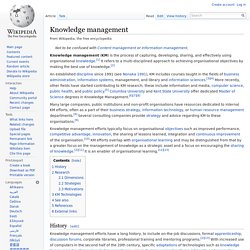
Personal knowledge management. Information architecture. Information architecture (IA) is the structural design of shared information environments; the art and science of organizing and labeling websites, intranets, online communities and software to support usability and findability; and an emerging community of practice focused on bringing principles of design and architecture to the digital landscape.[1] Typically, it involves a model or concept of information which is used and applied to activities that require explicit details of complex information systems.
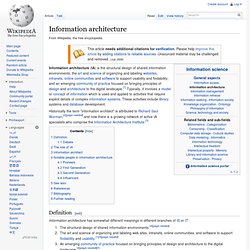
These activities include library systems and database development. Historically the term "information architect" is attributed to Richard Saul Wurman,[2][page needed] and now there is a growing network of active IA specialists who comprise the Information Architecture Institute.[3] Definition[edit] Information architecture has somewhat different meanings in different branches of IS or IT: The structural design of shared information environments. Debate[edit] The role of IA[edit] Content Management in a Knowledge Management Context — Prescient Digital Media - intranet consultant, intranet consulting, intranet planning and Internet planning. During an economic downturn such as the one we are working our way through at the moment (2010), organizations are looking to make the most of their investments in their technological infrastructure, how to squeeze greater efficiencies out of their product development or production processes through automation, and how to leverage their technology to generate efficiencies.
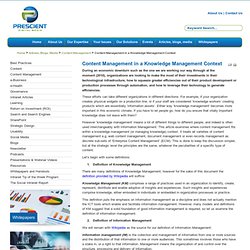
These efforts can take different organizations in different directions. For example, if your organization creates physical widgets on a production line, or if your staff are considered ‘knowledge workers’ creating products which are essentially ‘information assets’. Either way ‘knowledge management’ becomes more important in this economic climate. If you have to let people go, how do you ensure that vitally important knowledge does not leave with them? However ‘knowledge management’ means a lot of different things to different people, and indeed is often used interchangeably with Information Management. Knowledge Management as Educational Science.
Knowledge Management as Educational Science Our brains naturally function systematically, and if we can learn to teach and learn to this biological strength we can become far more effective.
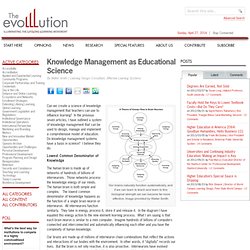
Image provided by Walter Smith. Classification schemes. Monitoring knowledge (management): an impossible task? « The giraffe. It isn’t an impossible task to monitor/evaluate (M&E) intangibles, knowledge or knowledge management (KM), but it requires a series of tough choices in a maze of possibles.
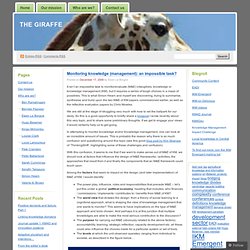
This is what Simon Hearn and myself are discovering, trying to summarise, synthesise and build upon the two M&E of KM papers commissioned earlier, as well as the reflective evaluation papers by Chris Mowles. We are still at the stage of struggling very much with how to set the ballpark for our study. So this is a good opportunity to briefly share a blogpost I wrote recently about this very topic, and to share some preliminary thoughts.
If we get to engage your views it would certainly help us to get going. Cynefin. The various domains of the Cynefin model.
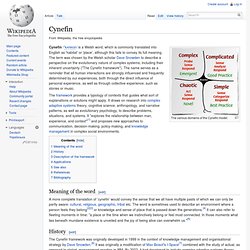
Cynefin /ˈkʌnɨvɪn/ is a Welsh word, which is commonly translated into English as 'habitat' or 'place', although this fails to convey its full meaning. The term was chosen by the Welsh scholar Dave Snowden to describe a perspective on the evolutionary nature of complex systems, including their inherent uncertainty ("The Cynefin framework"). The name serves as a reminder that all human interactions are strongly influenced and frequently determined by our experiences, both through the direct influence of personal experience, as well as through collective experience, such as stories or music. The framework provides a typology of contexts that guides what sort of explanations or solutions might apply. Knowledge extraction. Knowledge extraction is the creation of knowledge from structured (relational databases, XML) and unstructured (text, documents, images) sources.
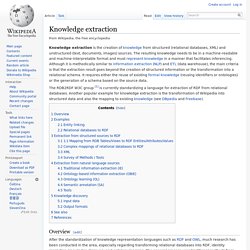
The resulting knowledge needs to be in a machine-readable and machine-interpretable format and must represent knowledge in a manner that facilitates inferencing. Although it is methodically similar to information extraction (NLP) and ETL (data warehouse), the main criteria is that the extraction result goes beyond the creation of structured information or the transformation into a relational schema.
It requires either the reuse of existing formal knowledge (reusing identifiers or ontologies) or the generation of a schema based on the source data. Overview[edit] After the standardization of knowledge representation languages such as RDF and OWL, much research has been conducted in the area, especially regarding transforming relational databases into RDF, identity resolution, knowledge discovery and ontology learning.
Knowledge retrieval. Knowledge Retrieval seeks to return information in a structured form, consistent with human cognitive processes as opposed to simple lists of data items.
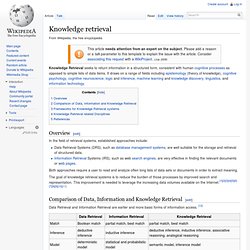
It draws on a range of fields including epistemology (theory of knowledge), cognitive psychology, cognitive neuroscience, logic and inference, machine learning and knowledge discovery, linguistics, and information technology. Overview[edit] In the field of retrieval systems, established approaches include: Data Retrieval Systems (DRS), such as database management systems, are well suitable for the storage and retrieval of structured data.Information Retrieval Systems (IRS), such as web search engines, are very effective in finding the relevant documents or web pages.
Data 2 Wisdom - D.I.K.W. KM Image. Knowledge & deep Search engine. KM Tools.